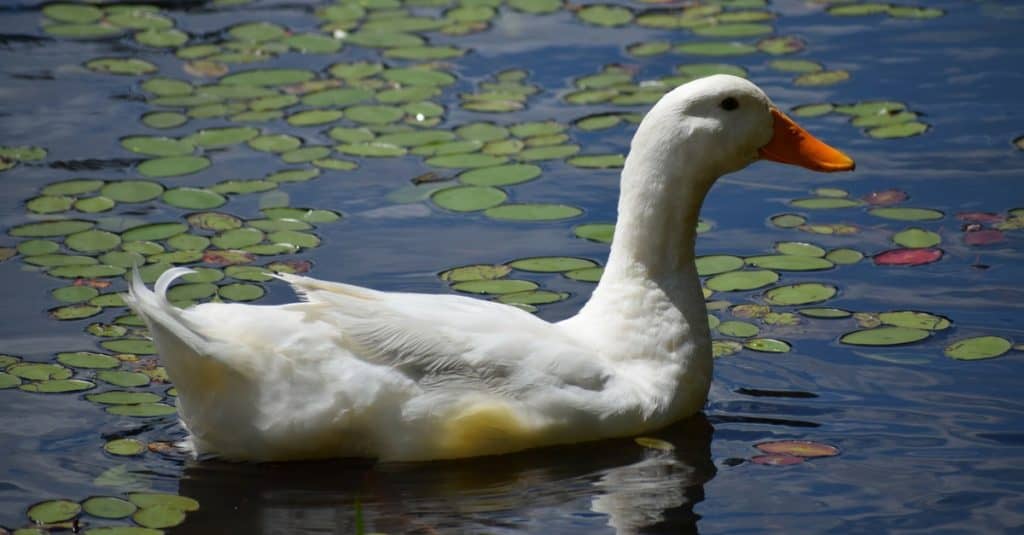Raising Ducks can be so much fun but what does it really take to keep them healthy? What breed should you choose? What is the ratio of drakes to hens? How to raise friendly ducks. What to feed, water and shelter needs. Health concerns and what to do when they arise. And MORE!
If you are interested in earning an income with your chickens, check this out: Chicken Rich
RAISING DUCKS
I truly have a love-hate relationship with ducks. They make such a mess but I can’t help but own some. Ducks are fairly easy to take care of but it’s nice to know all the details. Several times I’ve brought home an animal or bird and later thought, “Oh, I wish I had known that at the beginning of all of this!”
So, here it is. All the information that you need to know about ducks before you own them…even if you already own them. 🙂
You can find a lot of articles here on A Life of Heritage that will teach you a lot about poultry and be sure to check out DUCK DOUGH: Profitable Poultry Bundle–It’s FULL of to-do lists, checklists, record keeping sheets, and resource pages that will keep your flock healthy and YOU organized!
Duck Terminology
Drake: A male duck
Hen: A female duck
Duckling: A young duck
There are a few easy ways to usually tell the difference between a drake and a hen. The drakes usually are more brightly colored than the hens and have brighter or different colored heads and in some breeds, the color of their bills and feet will be an indicator of sex. The drakes also have a curl to their tail and the hens are usually louder in noise volume.
| Duck Color Chart by Breed Here
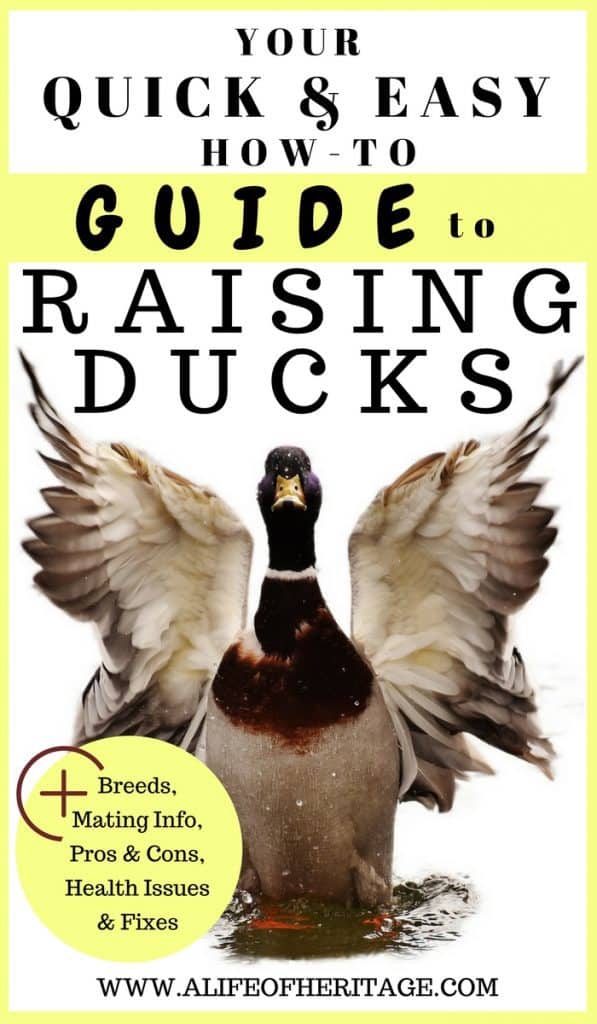
Breeds of Ducks
There are several duck breeds to consider. It’s important to know what your end goal is when choosing a breed. Are eggs, meat or both important? At a glance, here are 7 breeds to choose from.
Pekin
• White with yellow feet and bill
• Docile, friendly, calm, and hardy
• 150-200 white eggs per year
• Not broody
• Heavy bird: 8-9 pounds
• Ideal for eggs and meat
Buff Orpington
• Both the duck and drake have buff plumage, orange-yellow shanks and feet, and brown eyes. The drake’s bill is yellow while the duck’s bill is brown-orange.
• Hardy, generally docile, flightless, and great forager
• 150-220 white eggs per year
• Occasionally broody
• Heavy bird: 7-8 pounds
• Ideal for eggs and meat
Khaki Campbell
• Light brown with a bluish-green bill. The hens have brown feet and the drakes have orange feet and greenish heads
• Skittish but great foragers
• Up to 300 white eggs per year
• Not broody
• Light bird: 3.5-5.5 pounds
Swedish
• Blue, black, or silver (splash) with white bibs and slate bills
• Very calm, extremely hardy, good foragers
• 120-180 white eggs per year
• Broody temperament
• Heavy bird: 5-6.5 pounds
Saxony
• Drakes: oatmeal with a burgundy chest, silvery-blue wings, and charcoal gray-blue heads with a white ring around their neck and orange bills and feet. The hens are fawn-colored with white eye stripes and orange bills and feet.
• Active, alert, energetic, and excellent foragers. A rare breed in the U.S.
• 200 white eggs per year
• Broody temperament
• Heavy bird: 7-8 pounds
Mallard
• The females are brown with blue wingtips, the males have a distinctive greenish head.
• High energy, “talkative”, good-natured, and excellent flyers
• 60-120 greenish eggs per year
• Broody temperament
• Small bird: 2.5 pounds
Indian Runner
• They come in various colors including black, buff, fawn, white, gray, and chocolate.
• Active, and energetic but friendly and excellent foragers. They walk upright and rarely swim but love to bathe.
• 150-200 white or greenish eggs per year
• Small bird: 3-5.5 pounds
Duck Mating Information
It is very important to get the proper male-to-female ratios. Ducks are very aggressive in their breeding behavior. In fact, they have become known as the “rapists” of the fowl world.
What can happen to a duck surrounded by too many drakes?
• Injuries in the hen’s hips, legs, and back
• Overstress on the hen
• Missing feathers on the hen’s head and back
• Kept from water and food because of the over-aggressive mating
• Death by drowning or death by the aggressive acts of mating
If you would like more information about this, follow this link to watch a short YouTube video. Eye-opening? Uh-huh! You will never look at a male duck the same way again. At least they produce cute little duckling out of the whole ordeal!
In short, it’s important to have a ratio of at least 5 ducks or more to only one drake. Sometimes three ducks to one drake will work but it also may be too much for the hens. It all depends on the breed and the personalities of each individual drake. It is true that some drakes have a better disposition but that isn’t known until they are fully grown and possibly already causing problems.
Be sure to check out DUCK DOUGH: Profitable Poultry Bundle–It’s FULL of to-do lists, checklists, record keeping sheets, and resource pages that will keep your flock healthy and YOU organized!
Raising Friendly Ducks
I’ll be the first to admit I’ve raised ducks from the incubator who weren’t friendly and would act like I was going to kill them if I even looked at them from the corner of my eye. That’s no fun!
But there are things you can do to make sure that your fluffy little ducklings actually grow up to like you and follow you around.
And it all starts with spending a lot of time with them. They will imprint on whomever or whatever is around them in the first hours of life. Usually, that is the mother and the sibling ducks but in this case, it can be you! Many people find that ducklings will be friendly at the beginning but after the third week, there is a turn in their opinion of humans. It’s a “bump in the road” and just needs to be worked through.
The ducks need to associate you with their supply of food. Before bed take their food away from them and in the morning feed them in your hand. Give them “treats” as often as possible from your hand. Include other members of the family in this ritual of feeding them as often as possible.
Carry those ducklings around as much as possible and sit on the floor with them. Use this time to teach young children how to handle ducklings. They are very, very fragile.
When the ducks are older and start to act more skittish, don’t give up! Keep doing these same techniques! And remember, the surest way to lose a duck’s trust is to chase them.
And if you would like more information on raising friendly ducks go here.
Water Needs of a Duck
Water and ducks go together like the sun and the moon and the sand and the sea. Do ducks need a pond? No. But they do need continual access to water to turn into muddy sludge…that you will have to clean over and over and…you get the idea.
And if you don’t provide it for them, they will find it. I had to figure out a way to keep the ducks out of my goat water while also still allowing my goats easy access to the water as well. How many times did I go out to find my newly filled goat water tank completely muddy and filled with very happy ducks? Too many times.
Did you know, a duck can drink up to a half-gallon of water a day? That’s a lot! And they spill what seems like another 5 or so gallons (each!) on the ground as they splash and play in the water.
Ducks need a constant source of water with their food. They will shovel the food into their bills and then “down” it with water. The water will also help clean out the vents on top of their bills and will keep their mucous membranes moist as well. If they don’t have water, don’t put out the food. If they eat a lot of food without water, it will sit in their crop and has the potential of swelling up and choking them if they then drink a lot of water after eating.
The water also provides a bath to clean and preen in. Many times ducks will mate in the water. It makes the breeding process easier on the duck and gives her legs and back a break from the weight of breeding on the ground.
A small rubber bucket that is big enough for them to get their entire head dipped into the water is sufficient, but they will love a kiddie pool if you provide them with one. 🙂
The winter months up north (I live in Montana) make it very hard to keep water unfrozen during the winter and this is what I’ve found as the best solution for my duck water: Heated Base Poultry Water Heater. This heated base has been by far the best investment I’ve made in keeping water completely unfrozen during the bitter cold months of winter. And it’s lasted me through several winters so far!
Food Needs of a Duck
Ducks are excellent foragers, in fact, they are even better at it than chickens! And thankfully, ducks are also less destructive than chicken when foraging in the garden.
When foraging and for treats, ducks love to eat:
- slugs
- insects
- mealworms
- berries
- grass and seeds
- worms (oh! The duck love of a rainy day!)
- fruits and vegetables
Ducks can be fed the same diet as a chicken. The main source of nutrients coming from layer pellets. Do not feed them crumbles because it can be a choking hazard. They also love cracked corn, sunflower seeds, wheat, and any whole grain.
A chicken will eat about 4 oz of feed a day and a duck will eat 6-7 oz a day. So in comparison to a chicken, they do eat quite a bit more. In the spring, summer, and fall, when they can forage more, they will probably eat fewer pellets. But when winter comes and the snow covers the ground for 3 to 5 months, they will rely on and solely eat the pellets and treats given to them by you. (And remember all the work you did at the beginning to make them friendly? They will eat the treats right out of your hand and warm your heart smack dab in the middle of winter!)
Do not feed ducks bread. It’s fun and cute to watch ducks eat bread and it’s a well-known pastime at the park, but in reality, this can actually harm the birds. Bread, especially white bread, doesn’t have any nutritional value and can actually cause health issues and lameness, which in turn affects egg production and increases their chances of predators catching them.
Housing Needs of a Duck
The term “sitting duck” was coined for a reason. They truly are sitting ducks when it comes to predators and a secure housing setup will protect a duck from danger, wind and keep them out of the snow during the winter months. But don’t worry about needing housing during the rainy days, the ducks will be quacking happily and marching around in a row snacking on all the unsuspecting worms coming to the surface.
Ducks do not perch, so do not need roosts. And they can be housed in the chicken house. They need adequate ventilation at all times. Straw is a great resource to use for bedding and the housing set up should allow for at least a height of 3 feet and 4 square feet per bird.
The housing setup is really low-key and doesn’t have to be elaborate. These hardy birds will be happy to be safe, fed, and watered in whatever setup you can provide for them.
Nesting Needs of a Duck
Ducks, from my experience, love to play Easter year around. Oh! A nest in the woodpile! Now it’s buried in the compost pile! A random “oops!” there’s an egg in the middle of the walkway! And when the eggs are all removed from one location, the next location is chosen. And ducks bury their eggs, at least my Buff Orpingtons did, all covered up, nice and neat and out of sight. A nest of 30 eggs? How old are these anyway??
Providing a nest box is a great way to encourage ducks to lay in a specific location but don’t expect them to actually do that. A corner of the house can be set up with a nest box with extra straw and the duck may decide that that is a great place to leave you eggs…or not.
Fencing Needs of a Duck
Most of the larger breeds of ducks can’t fly but I’ve found that, like a mouse, if the duck can fit its bill through a hole, they can squeeze through to the other side. But that just means that their area of foraging is larger!
But in certain areas, where predators are more prevalent, ducks will need to be kept safe. Their house will give them a place to sleep at night and an area outside of that will give them a safe place to forage and have room to spread their wings, free from danger.
Our pallet fence has made a great safe place for all of our animals.
Raising Ducks With Chickens
Ducks and chickens can live together. It is not wise to raise ducklings and chicks together, however. Here are a few reasons why ducklings shouldn’t be kept in the same brooder as chicks:
- Ducks are so messy and all the moisture can cause chicks to chill and become sick.
- Ducks grow much faster than chicks and can unknowingly run over and squish little chicks
- Ducks eat much more than chicks and can push out the chicks from the eating area
But after they are all grown, they can happily coexist. Although, when I had equal amounts of ducks and chickens, I did find that the ducks were much pushier and kept the chickens from the food and water during the confined winter months. Just keep an eye out for abnormal behavior and how everyone is treating each other.
How To Raise Ducks for Eggs
The most important factor in ducks laying eggs is their nutrition. All of what has been written about previously will keep a duck healthy and happy, but the food they eat will provide them the energy needed to create a healthy egg.
Usually, ducks lay their eggs early in the morning. If they are confined to their house during the night and let out mid-morning, usually the eggs will be easy to find and if picked on a regular basis, they will be cleaner as well.

How to Raise Ducks for Meat
Raising your own meat is a wonderful way to put nutritious, nutrient-dense food on your family’s table. Again, an important factor in the health of the meat is the health of the duck, which is grown with the food made available.
Feed your ducks a well-balanced, nutritious diet! They will be more content, healthier and will provide a healthy meal.
Health Concerns to Watch for in a Duck
Eye Infections
The Issue: Remember the rough mating that ducks are known to take part in? This can be problematic and cause a bubble around the eyes of a hen. Ammonia and dust can also cause issues and irritate the eyes.
The Fix: Keeping the ratio of ducks to drakes at an appropriate level and getting rid of drakes that are too aggressive will keep your ducks safe from rough mating. And keeping the housing and bedding clean and dry will help with ammonia smells.
Bumblefoot
The Issue: This happens when the bottom of a duck’s webbed foot gets a scratch that becomes infected and gets a black scab and swells.
The Fix: Keep the housing and run free from sharp objects, rocks, and anything that could potentially cut the feet of ducks. Clean and treat any cuts to prevent the infection from spreading and causing lameness.
Egg Binding
The Issue: The duck can’t pass the egg.
The Fix: Soak in warm water and gently put vegetable oil or coconut oil around the vent to hopefully relax the muscles to allow the egg to pass.
Bound Crop
The Issue: Anything foreign entering the crop. This could be a string, long grass pieces, or anything that the duck should not have eaten. The throat will be swollen and red.
The Fix: Massage the area to encourage it to dislodge and pass. Vegetable oil may help it to break up and pass as well.
Botulism
The Issue: This is a bacterium that thrives in decaying waste and pools of dirty water. It can cause death within hours.
The Fix: Keep water sources clean. Use vinegar and scrub brushes on the watering containers and pools.
Angel Wing
The Issue: Overfeeding protein will cause the wing to grow too fast and not allow the wing to lay flat against the body.
The Fix: Switch to lower protein feed, sling the wings, and allow the birds plenty of exercise.
Aspergillosis
The Issue: Heavy, labored breathing caused by wet feed and wet bedding.
The Fix: Remove wet feed and bedding promptly.
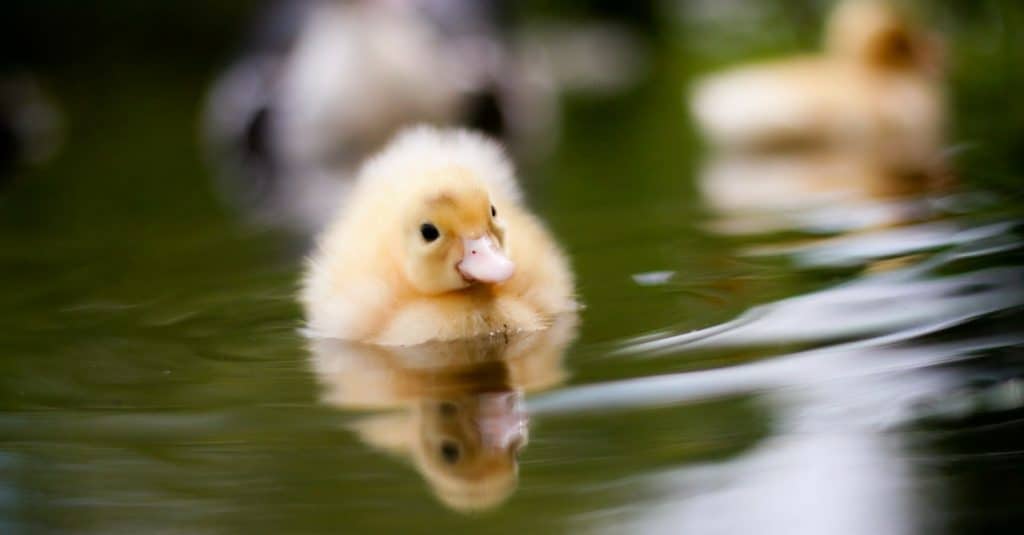
Raising Ducks From Egg to Adult
Hatching Duck Eggs
There are several ways to begin with ducks: buy day-old ducklings or hatch duck eggs! Either way is wonderful but there is a special wonderful when hatching your own critters. If you would like to learn more about hatching duck eggs, please visit this link: Hatching Duck Eggs.
Raising Ducklings
Raising ducklings is so much fun and this stage is so short and sweet! If you would like to read more in-depth information about ducklings, please follow this link: The Surefire Way to Raise Healthy Ducklings
7 Ways to Profit Raising Ducks
There are several ways to earn an income with ducks. Here is the short and sweet version:
- Sell fresh eating eggs
- Sell day-old ducks
- Sell adult ducks
- Sell fertile eggs
- Sell duck meat
- Sell feathers
- Sell manure
Benefits of Raising Ducks
Ducks are fun and full of antics. They put a smile on anyone’s face. Here are a few reasons you should add ducks to your life:
- Excellent help in the garden without all the scratching ruin that chickens leave in their wake. They are great foragers and help keep the bug population to a minimum.
- They are very cold-hardy. Their added layer of fat, waterproofed feathers, and the extra down keep them very cozy!
- But they also stay much cooler than chickens in the summer heat. Why? Their ability to dip in the cool water.
- They usually have fewer mites and parasites because of all the time spent in the water.
- Hardier immune system.
- Ducks are usually quieter. The female ducks do all the noise-making and will make quite a ruckus when they are agitated.
- They do lay delicious eggs. Read all about them: Duck Eggs-All the Facts and How to Sell Them
- Although their mating leaves something to be desired, their pecking order rituals are far less aggressive than a chicken’s pecking order.
Cons of Raising Ducks
There. I said it. There are a few cons to raising ducks and it’s worth thinking about before jumping into the duck pool with both feet.
- Ducks are messy. Oh my, they are messy. They will find any and all water troughs and literally turn them into sludge. Deep, dark, dirty sludge.
- Although they are less intrusive in the garden, if a gaggle of ducks finds themselves in a puddle made by the sprinkler in the flower bed, you can bet that their big feet will squish everything in sight. But they sure had fun slurping and playing in the water!
- Depending on the breed, the number of ducks, and the flock characteristics, I’ve found that the ducks I’ve owned are noisier than my chickens.
- They eat quite a bit more than a chicken, which compounds the amount of feed needed if you have quite a few ducks.
- If the time hasn’t been spent with them to make them friendly, they are really skittish, and that’s no fun.
- If they are allowed to solely free-range, they have the propensity to lay their eggs wherever they get the whim, which can send you on a wild goos…duck egg chase every day.
Raising ducks is worthwhile fun if you know what you are getting into and can provide them with the care they thrive on.
What do you think? Did I hit all the main points of duck ownership?
If you love ducks, here’s further reading about ducks:
Be sure to check out DUCK DOUGH: Profitable Poultry Bundle–It’s FULL of to-do lists, checklists, record keeping sheets, and resource pages that will keep your flock healthy and YOU organized!
If you would like further reading go here, here, here, here, here, and here.
- Your Quick and Easy How-To Guide to Raising Ducks
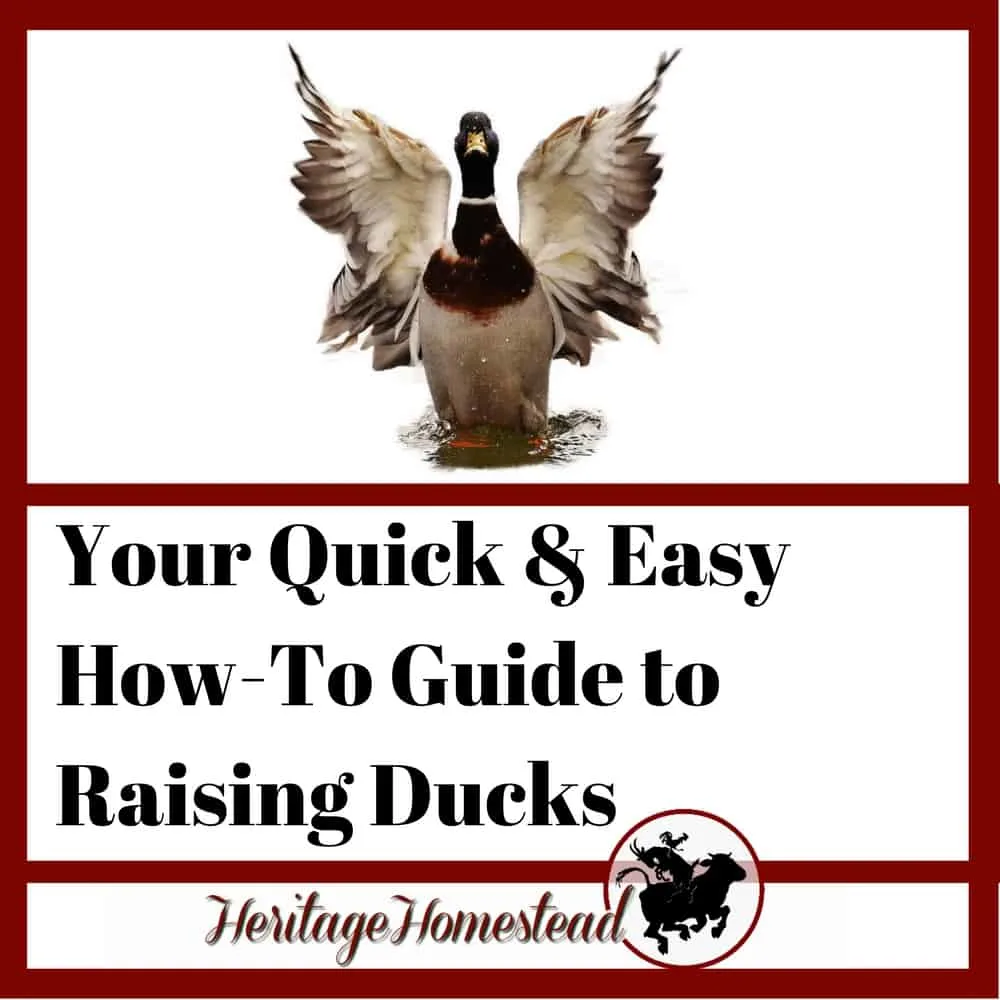
- How to Hatch Duck Eggs
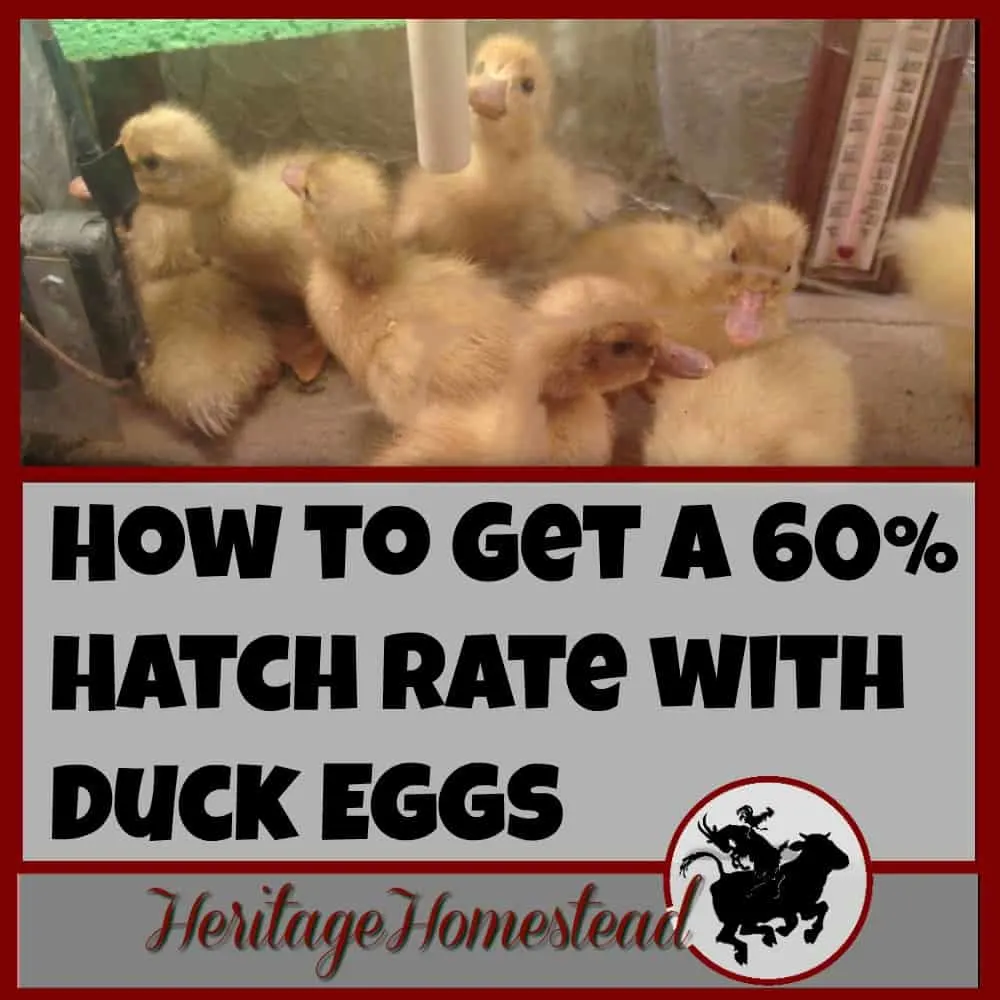
- Duck Breeds: 14 Breeds YOU Could Own and Their Facts at a Glance
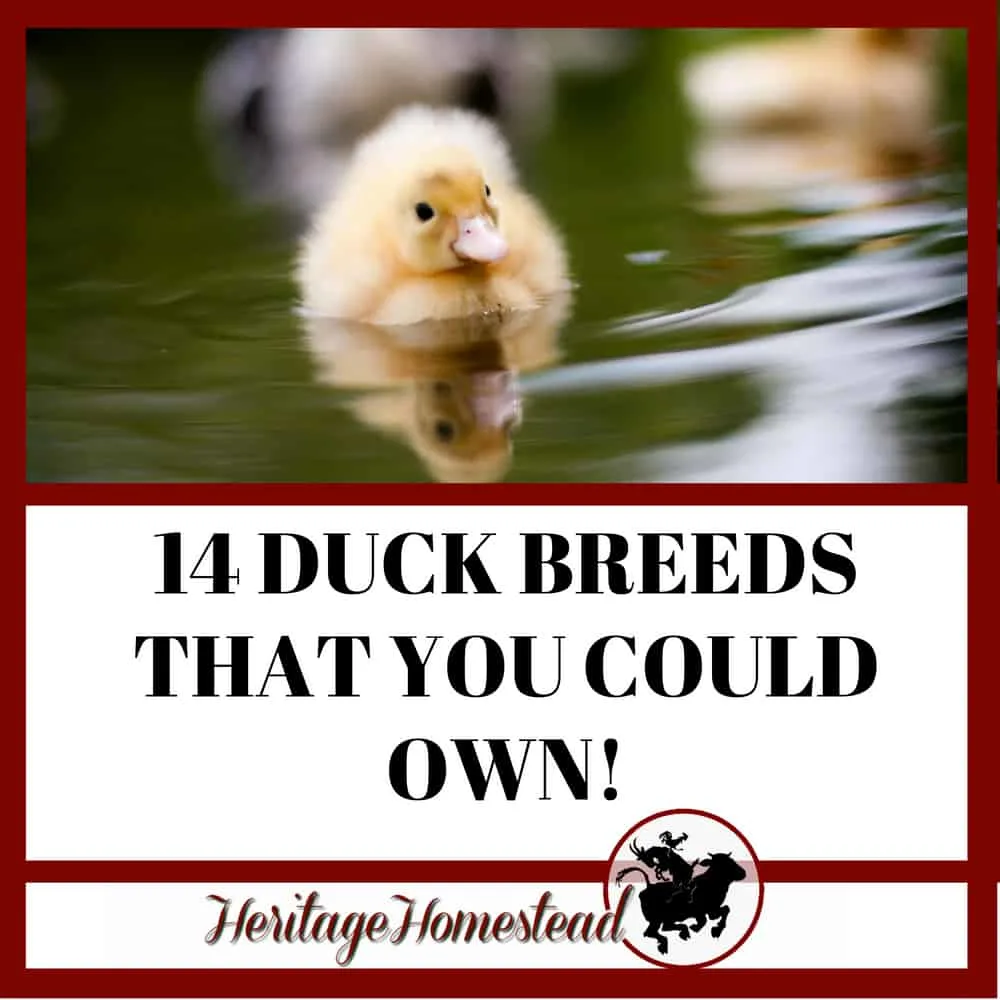
- All the Duck Egg Facts (+10 Tips to Selling Duck Eggs)

- What Do Ducks Eat? How-To and Tips for Domestic and Wild Ducks

- The Sure Fire Way to Raise Healthy Ducklings

